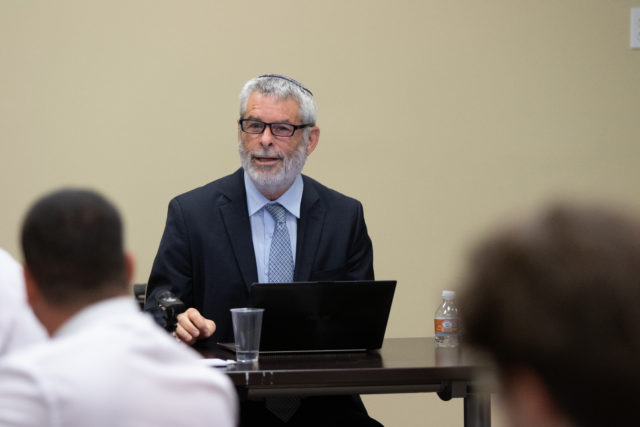Three canards often invoked to criticize or even oppose close U.S.-Israel security cooperation are:
- Good relations with Israel preclude such ties with Arab countries;
- America bears the burden of defending the Jewish state; and
- Israel uses U.S aid to oppress the Palestinian Arabs.
Not only are none of the above beliefs true, in each case the opposite is correct, asserted speakers at the Jewish Policy Center’s June 25 luncheon on “U.S.-Israel Security Cooperation: The Unpublicized Mutual Benefits.”

Shoshana Bryen, JPC senior director, said close American security cooperation with a number of Arab countries operates independently of U.S.-Israel ties. Further, some of those same Arab states, including Egypt, Saudi Arabia and the United Arab Emirates, increasingly see Israel as a partner—and not always a silent one—in their struggles with Iran.
Hillel Frisch, a Middle East specialist and professor at Bar-Illan University in Israel and senior fellow at the Jerusalem Institute for Strategic Studies noted that Israel, at $3.3 billion annually and set to rise to $3.8 billion, often is listed as the largest recipient of U.S. security assistance. But unlike economic powerhouses Japan, South Korea and Germany, Israel never has needed American “boots on the ground” to defend itself.
When the expenses of maintaining large numbers of GIs in those countries are tallied, “Israel in no way is the biggest beneficiary of U.S. aid,” Frisch stated. He said that according to one study, the approximately 60,000 American military and civilian defense personnel in Japan cost taxpayers more than $27 billion annually, a little less than $25 billion after Tokyo’s partial reimbursements.
For Germany and South Korea, actual annual U.S. security assistance is $21 billion and $15 billion, respectively. Even Italy receives about twice the defense aid as Israel, Frisch said.
And those figures might underestimate the real U.S. costs of stationing forces abroad, he added. Numbers are classified but air and sea patrols by American assets in defense of other allies and partners, joint ground and maritime exercises with host countries and other operations mean that “most of the security of U.S. allies—in Europe, Asia—is ‘Made in America,” Frisch said. “In striking contrast, no U.S. airplanes are flown to defend Israel. No U.S. military personnel are put at risk for Israel” as vulnerable “trip wire” forces like those along the demilitarized zone (DMZ) between North and South Korea and elsewhere.
“This is not to assail the relationship between the United States and its [other] allies, Frisch said. Washington does benefit from such partnerships, whereas rivals such as China and Russia “have almost no allies,” and when they do, the relationships carry a “net cost.”
“The United States benefits enormously from its relations with Israel,” Bryen asserted. In the Cold War with the Soviet Union, “the United States couldn’t face all enemies of all of its allies at once,” she said, so the first U.S.-Israel defense Memorandum of Understanding (MOU) was signed in 1981. Washington realized Israel had gone “from being a ‘security consumer’ to a ‘security provider.’”
For example, in the 1967 Six-Day War, the 1973 Yom Kippur War and the 1982 Israel-Palestine Liberation Organization conflict in Lebanon, “Israel was fighting pro-Soviet forces with Soviet equipment.” Bryen said intelligence shared about captured Moscow-built weapons and exposure of Soviet military doctrine, as in ’73’s Israel tank warfare victories over Egyptian and Syrian forces, “influenced U.S. combined-arms doctrine” employed in the 1991 Persian Gulf War.
Israeli destruction of Iraq’s nuclear reactor at Osirak in 1981 meant American and coalition troops wouldn’t face a nuclear-armed Saddam Hussein in 1991, Bryen said. Israel’s elimination in 2007 of a Syrian nuclear reactor under construction “told us a lot about Russian air defenses.” And after al-Qaeda’s Sept. 11, 2001 attacks in New York City and against the Pentagon in Washington, D.C., Israel shared with America lessons learned regarding rescue and relief efforts, intelligence gathering and counter-terrorism.
Today, some U.S. troops are stationed in Israel, Bryen said. Not to defend the Jewish state, but to operate an X-band radar installation to collect intelligence on countries located further east.
As for using American money to oppress Palestinian Arabs in the West Bank and Gaza Strip, Bryen recalled that during the 2014 Israel war against Hamas (Palestinian Islamic Resistance Movement) in the Gaza Strip, the Obama administration said Israel should take greater care to avoid non-combatant casualties. But not long after, an audience in New York City heard Gen. Martin Dempsey (Ret.), then chairman of the U.S. Joint Chiefs of Staff, say that the Israelis had gone out of their way to minimize civilian deaths. In fact, Dempsey said, the American military was sending a “lessons learned” team to Israel to see if it could benefit.
American relations with NATO member Turkey, under Islamist-leaning President (and previously prime minister) Recep Tayyip Erdogan, have deteriorated. Virtually no NATO countries other than the United States spend more than two percent of their gross domestic product on defense and few can project military power over long distances.
Frisch summarized: Israel “is very important [to the United States] in containing Iran.” And it “is now is the only reliable U.S. ally between Europe and Japan.”


